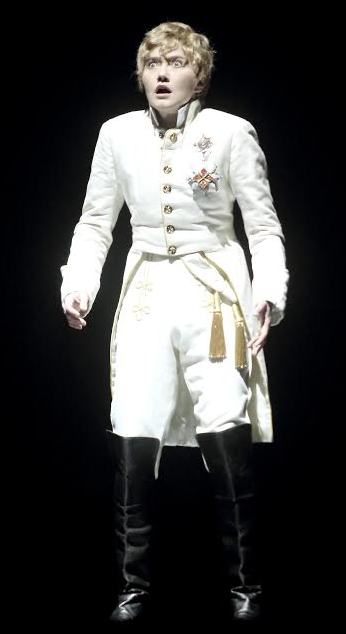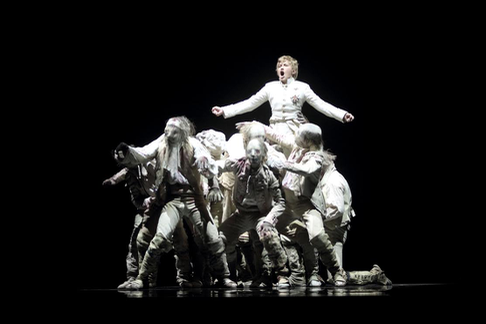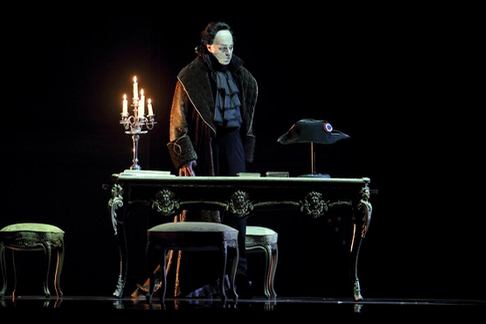Recently in Reviews
English Touring Opera are delighted to announce a season of lyric monodramas to tour nationally from October to December. The season features music for solo singer and piano by Argento, Britten, Tippett and Shostakovich with a bold and inventive approach to making opera during social distancing.
This tenth of ten Live from London concerts was in fact a recorded live performance from California. It was no less enjoyable for that, and it was also uplifting to learn that this wasn’t in fact the ‘last’ LfL event that we will be able to enjoy, courtesy of VOCES8 and their fellow vocal ensembles (more below …).
Ever since Wigmore Hall announced their superb series of autumn concerts, all streamed live and available free of charge, I’d been looking forward to this song recital by Ian Bostridge and Imogen Cooper.
The Sixteen continues its exploration of Henry Purcell’s Welcome Songs for Charles II. As with Robert King’s pioneering Purcell series begun over thirty years ago for Hyperion, Harry Christophers is recording two Welcome Songs per disc.
Although Stile Antico’s programme article for their Live from London recital introduced their selection from the many treasures of the English Renaissance in the context of the theological debates and upheavals of the Tudor and Elizabethan years, their performance was more evocative of private chamber music than of public liturgy.
In February this year, Albanian soprano Ermonela Jaho made a highly lauded debut recital at Wigmore Hall - a concert which both celebrated Opera Rara’s 50th anniversary and honoured the career of the Italian soprano Rosina Storchio (1872-1945), the star of verismo who created the title roles in Leoncavallo’s La bohème and Zazà, Mascagni’s Lodoletta and Puccini’s Madama Butterfly.
Evidently, face masks don’t stifle appreciative “Bravo!”s. And, reducing audience numbers doesn’t lower the volume of such acclamations. For, the audience at Wigmore Hall gave soprano Elizabeth Llewellyn and pianist Simon Lepper a greatly deserved warm reception and hearty response following this lunchtime recital of late-Romantic song.
Collapsology. Or, perhaps we should use the French word ‘Collapsologie’ because this is a transdisciplinary idea pretty much advocated by a series of French theorists - and apparently, mostly French theorists. It in essence focuses on the imminent collapse of modern society and all its layers - a series of escalating crises on a global scale: environmental, economic, geopolitical, governmental; the list is extensive.
For this week’s Live from London vocal recital we moved from the home of VOCES8, St Anne and St Agnes in the City of London, to Kings Place, where The Sixteen - who have been associate artists at the venue for some time - presented a programme of music and words bound together by the theme of ‘reflection’.
'Such is your divine Disposation that both you excellently understand, and royally entertaine the Exercise of Musicke.’
Amongst an avalanche of new Mahler recordings appearing at the moment (Das Lied von der Erde seems to be the most favoured, with three) this 1991 Mahler Second from the 2nd Kassel MahlerFest is one of the more interesting releases.
‘And there was war in heaven: Michael and his angels fought against the dragon; and the dragon fought and his angels, And prevailed not; neither was their place found any more in heaven … that old serpent … Satan, which deceiveth the whole world: he was cast out into the earth, and his angels were cast out with him.’
If there is one myth, it seems believed by some people today, that probably needs shattering it is that post-war recordings or performances of Wagner operas were always of exceptional quality. This 1949 Hamburg Tristan und Isolde is one of those recordings - though quite who is to blame for its many problems takes quite some unearthing.
There was never any doubt that the fifth of the twelve Met Stars Live in Concert broadcasts was going to be a palpably intense and vivid event, as well as a musically stunning and theatrically enervating experience.
‘Love’ was the theme for this Live from London performance by Apollo5. Given the complexity and diversity of that human emotion, and Apollo5’s reputation for versatility and diverse repertoire, ranging from Renaissance choral music to jazz, from contemporary classical works to popular song, it was no surprise that their programme spanned 500 years and several musical styles.
The Academy of St Martin in the Fields have titled their autumn series of eight concerts - which are taking place at 5pm and 7.30pm on two Saturdays each month at their home venue in Trafalgar Square, and being filmed for streaming the following Thursday - ‘re:connect’.
The London Symphony Orchestra opened their Autumn 2020 season with a homage to Oliver Knussen, who died at the age of 66 in July 2018. The programme traced a national musical lineage through the twentieth century, from Britten to Knussen, on to Mark-Anthony Turnage, and entwining the LSO and Rattle too.
With the Live from London digital vocal festival entering the second half of the series, the festival’s host, VOCES8, returned to their home at St Annes and St Agnes in the City of London to present a sequence of ‘Choral Dances’ - vocal music inspired by dance, embracing diverse genres from the Renaissance madrigal to swing jazz.
Just a few unison string wriggles from the opening of Mozart’s overture to Le nozze di Figaro are enough to make any opera-lover perch on the edge of their seat, in excited anticipation of the drama in music to come, so there could be no other curtain-raiser for this Gala Concert at the Royal Opera House, the latest instalment from ‘their House’ to ‘our houses’.
"Before the ending of the day, creator of all things, we pray that, with your accustomed mercy, you may watch over us."
Reviews

19 Feb 2016
L'Aiglon in Marseille
Napoleon I (Bonaparte) was known as the Aigle (eagle), his son by Marie Louise (of the Hapsburgs) later became called the Aiglon (eaglet). At birth he was dubbed the King of Rome by his father. Unofficially and very briefly he was Napoleon II. Exiled in Austria he was officially titled the Duke of Reichstadt and the Prince of Parma.
All this would probably remain a footnote to history except Marseille born playwright Edmond Rostand (author of the famous Cyrano de Bergerac) wrote a six act play (1900) that wrung hearts in beautiful alexandrine verse about this young man who was deluded into believing he could restore the Bonapartists to France. The fabled Austrian diplomat Metternich who in fact had engineered the marriage, raison d’état, that begot the Aiglon was now a formidable counterforce for raisons d’état — not to mention his young age and fragile health.
Films based on the Rostand play were made in 1913, 1921 and 1931. In 1936 composers Jacques Ibert and Arthur Honeger joined forces to create an opera (joint compositions a practice Ibert in particular pursued it seems). The libretto was created by the prolific Henri Cain (many operas for Massenet as example) based on the Rostand play, then ruthlessly modified by the composers.
 Stéphanie D'Oustrac as Napoleon II reinventing the Battle of Wagram
Stéphanie D'Oustrac as Napoleon II reinventing the Battle of Wagram
Ibert composed acts I and V, Honegger wrote II, III and IV, acts I, III and V are based largely on Viennese walzes much in keeping with the boulevard musical popular in Paris between the world wars. Honegger proves himself again a formidable dramatic composer in Acts II and particularly in Act IV which was an evocation of the stunning victory of Napoleon I at the battle of Wagram. Ibert interspersed some lovely airs in Act I and engineered a lovely, touching death in Act V. Both composers created sophisticated music easily accessible to a broad, early mid-twentieth century Parisian public.
The first and biggest problem of the evening was that the program booklet proclaimed no historical context for the opera. Most of us were in the dark, after all the happenings are a minor footnote to history. The program contained only the biographies of the artists plus self-congratulatory notes by the stage director. A “synopsis” stated only that the story is the pathetic attempt to restore Napoleon II as emperor of France. Period. With absolutely no context provided we were forced to keep our eyes glued on the supertitles, deciphering the alexandrines as best we could to create the story that was unfolding way down there on the stage.
And in fact it is a good story, well told by messieurs Ibert and Honegger.
Among other problems of the evening was the Aiglon herself, Stéphanie D’Oustrac who was suffering from a bad cold. In spite of this Mme. D’Oustrac managed a total performance, creating the youth, vulnerability, idealism, naïveté and delusion of the 21 year-old soldier in often very beautiful voice, and even in the passages in which she was vocally restrained the poetic voice of the Aiglon was never lost. It was a tour de force performance by a very special artist.
The remainder of the cast did not achieve the stature sufficient to support such a performance. There were those who were viable and those who were not, those who could sing and those who could not, those who were too young or too old for their roles. In particular the role of Flambeau, the faithful footman who naively deludes the young soldier, demanded an artist of accomplishment and stature. Such an artist was not provided.
 Franco Pomponi as Metternich
Franco Pomponi as Metternich
This was a remount of a 2004 Marseille production by the metteur en scène team Moshe Leiser and Patrice Caurier. It is typical of their style which is quite spare but very precise both in decor and by focus of light — characters are placed in specific shafts, lines and pools of light for specific and powerful moments of revelation. It can be very effective. The remount by former Marseille Opera directeur général Renée Auphan did not effect the style, hampered by poor casting as well as by attempting to recreate such a precise production so long after it was fresh.
If anything went right it was the pit! Conductor Jean-Yves Ossonce coaxed the Marseille orchestra to beautiful playing, capturing the spirit of the waltzes, the sweetness of the airs, and the dramatic force and colors of the Honegger acts. The pit did indeed make a fine recommendation for this piece to find its way occasionally onto repertory starved, adventurous stages around the world.
Michael Milenski
Casts and production information:
L’Aiglon: Stéphanie D’Oustrac; Thérèse de Lorget: Ludivine Gombert; Marie Louise: Bénédicte Rousseno; La Comtesse Camerata: Sandrine Eyglier; Fanny Elssler: Laurence Janot; Isabelle, le Manteau vénitien: Caroline Gea; Flambeau Marc Barrard;
Le Prince Metternich: Franco Pomponi; Le Maréchal Marmont: Antoine Garcin;
Frédéric de Gentz: Yves Coudray; L’Attaché militaire français: Éric Vignau; Le Chevalier de Prokesch-Osten: Yann Toussaint; Arlequin: Anas Seguin; Polichinelle, un Matassin: Camille Tresmontant; Un Gilles: Frédéric Leroy. Chorus and Orchestra of the Opera de Marseille. Conductor: Jean-Yves Ossance; Production: Patrice Caurier and Moshe Leiser; Metteur en scène: Renée Auphan; Décors: Christian Fenouillat; Costumes Agostino Cavalca; Lumières: Olivier Modol d'après original lighting designer Christophe Forey. The Opéra de Marseille, February 16, 2016.


